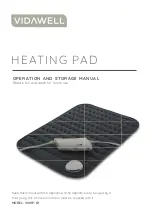
3
Infrared Heat
Patio Plus heaters are effective in heating outdoor spaces because they utilize infrared or
radiant heat. Infrared energy is the same type of warmth we get from the sun. Infrared
energy warms people and objects without heating the intervening air. Unlike the sun,
Patio Plus heaters do not produce Ultraviolet (UV) rays that can be harmful. Infrared
energy travels by line-of-sight so the designer must be aware that doors, panels or
windows may obstruct the infrared energy from reaching the desired location.
Overlapping infrared patterns from numerous heaters may be used effectively to provide
even heat distribution. Where multiple heaters are used with the remote switching option
it is suggested that they be switched independently, so as to allow for flexibility in
heating larger areas as the space becomes occupied by more people. A timer is a good
method to ensure that all heaters are turned off when the patio is not being used.
Because infrared heaters heat people and objects, and thermostats measure air
temperature, a thermostat may not be the best method for controlling outdoor heaters.
Enclosed Patios
Enclosed patios must be large enough to meet the clearance to combustibles, and
ventilation requirements as provided for in all applicable codes. For very small-enclosed
patios, Patio Plus heaters may not be suitable. DANGER: Patio Plus heaters are not
vented to the outdoors. Failure to comply with applicable ventilation requirements could
cause serious injury of death.
Patio Design Considerations
Heater placement is critical for effective and efficient patio heating. If heaters are placed
too close together, or mounted too low, patrons of the patio may become uncomfortable.
If heaters are placed too far apart, or too high, on a breezy or wind-swept patio, the area
may never become comfortable. Infrared heaters work best if placed in areas of greatest
heat loss, such as the open side of a semi-protected patio.
Windy conditions can be a problem when heating any patio. Windbreaks can be
extremely effective in increasing comfort levels. The heating requirements of any patio
depend greatly on local climatic conditions. It is recommended that you work with a
local and experienced supplier and installer who are familiar with the heating
requirements of your area. This product could make carbon monoxide. 400 parts per
million of CO for one hour in an unvented room will damage the brain and coul cause
death.
Содержание Patio Plus
Страница 15: ...15...

































